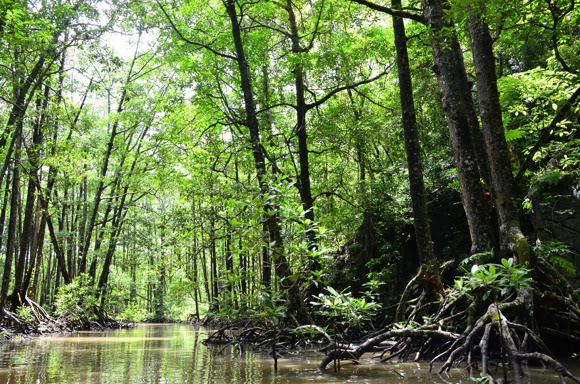OECS celebrates International Day for Biological Diversity 2020

The OECS Commission salutes its eleven (11) Member States as we observe the United Nations International Day for Biological Diversity (IDB) on 22 May 2020.
The theme for this year: Our Solutions are in Nature emphasises that Biodiversity – the variety of plant and animal life, is essential for social wellness, economic growth, ecosystem functioning and environmental sustainability in our region and the attainment of most – if not all of the Sustainable Development Goals.
As with many island nations, the approximately 1.1 Million inhabitants in the OECS are heavily dependent on the rich biodiversity and healthy ecosystems within our land and seascapes for food, shelter, livelihoods, protection from natural and anthropogenic hazards, and which contribute to our physical and mental wellbeing. However, the region’s biological resources are frequently threatened by overexploitation, pollution and habitat degradation resulting from some human activities. Therefore, we need to live in harmony with nature if we are to continue benefitting from ecosystems goods and services. This need is highlighted by recommendations for fighting COVID-19 which include boosting our immune systems through proper nutrition and exercise.

The Secretariat of the United Nations Convention on Biological Diversity points out in its 2020 IBD message that,
It is the year where, more than ever, the world can signal a strong will for a global framework that will “bend the curve” on biodiversity loss for the benefit of humans and all life on Earth.
The OECS region must therefore do its utmost to ensure that, in the era of growing nationalism by some developed countries, our Small Island Developing States do not become more vulnerable to external shocks. Biodiversity and ecosystems management is critical to enhancing our resilience.
The OECS has initiated the process of reducing Member States’ vulnerability through the development of a Biodiversity and Ecosystems Management Framework (BEF). This Framework builds on the recently developed Caribbean Biodiversity Strategy and contributes to the 2030 Sustainable Development Agenda.
Priority areas for action identified under this Framework relate to:
- Protection and restoration of ecosystems;
- Invasive species management, biosecurity and biosafety;
- Climate and disaster resilience;
- Fair and equitable access to and sharing of benefits from biodiversity resources; and
- Integration of biodiversity and ecosystems valuation into national development processes.
The OECS in collaboration with the Caribbean Natural Resources Institute (CANARI), has also proposed a green-blue economy strategy and action plan which provides a roadmap for private and public sector investment into natural capital.
The OECS under the Adapt’Action programme has produced some information materials to promote gender and ecosystem-based adaptation in our region. Today, in observance of IDB, the OECS is launching a 3 minute video on Building resilience with nature and gender in the Eastern Caribbean. The EbA and gender Toolkit will be launched on World Environment Day, 5 June 2020.
The COVID-19 global pandemic and its impacts on our food security and economic stability have highlighted the need to reduce our dependence on food imports and fossil fuels and move into more sustainable production and consumption practices including the use of nature-based solutions such as available local plant species, organic gardening, integrated pest and disease management and energy and water use efficiency.

We therefore encourage citizens to start or increase cultivation of backyard or home gardens, plant at least one fruit tree and support our local agro-producers. We also encourage business enterprises to make greater use of renewable energy innovations such as solar power and implement water efficient technologies.
As we emerge from this lockdown, maybe while walking in our neighbourhood, along the beach, or on a nature trail, let us take a fresh look at nature and its benefits and attractions. Let us reflect on the effects of our activities on this precious resource and how we can contribute to ensuring its sustainable use. We rely on nature for our quality of life, can nature rely on us?
Please share how you are promoting nature-based solutions in your business, workplace, neighbourhood and or home!Joan John-NorvilleBiodiversity and Ecosystems Management Coordinator, Environmental Sustainability Cluster, Organisation of Eastern Caribbean States





